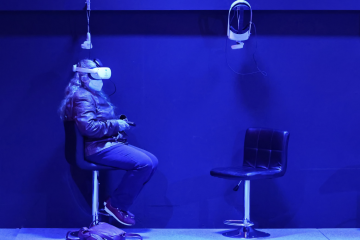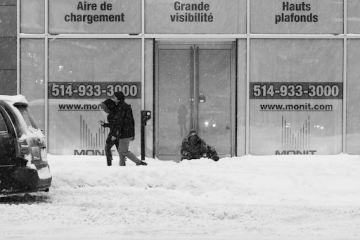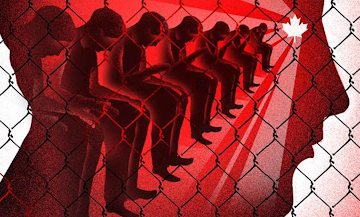Activists for Montreal’s homeless and Indigenous populations, two communities disproportionately affected by COVID-19 in Canada, have been advocating for these groups’ increased protection since the beginning of the pandemic nearly a year ago. The inadequacies previously seen in the country’s health and social policies have only been magnified in recent times. Despite advocates’ constant efforts, the government has been persistently ineffective in addressing the needs of unhoused populations considering that they had the resources to provide much more aid than they have so far, especially in regards to long-term solutions. The few constructive decisions taken in recent months were reactive as opposed to proactive, which seems to be a recurring theme when looking at officials’ actions regarding the homeless community’s plight throughout this pandemic.
Slightly over two weeks after the World Health Organization’s (WHO) declaration of the coronavirus as a global pandemic, Montreal Mayor Valérie Plante announced a local state of emergency on March 27, 2020, citing fears over outbreaks among the city’s homeless population. This declaration would grant the government “exceptional powers” in utilizing the city’s resources so as to give them the best chance at fighting the virus, especially in regards to the homeless populations, who needed places to sleep and possibly quarantine. Already, the city had nearly 1,000 cases on record, and Allison Reid, the director of the Montreal Indigenous Community NETWORK, reported that organizations aiding Indigenous people living on the streets had “received nothing — not one dollar, not one bar of soap, not one extra pair of hands” in the start of the battle against this pandemic. Reid acknowledged that some people within the government were trying their utmost in this regard, yet the fact of the matter remained that little had actually been done, with various shelters facing possible closure due to overwhelming numbers. Resilience Montreal, one such shelter, had already reached this point by the end of March. Despite outside centres being set up to provide food, drinks, and public washrooms, both advocates within these organizations and even government officials were aware that this would not be enough to ensure the safety and wellbeing of homeless communities in the coming months.
The hard-hit Indigenous communities experiencing homelessness faced further obstacles throughout the year, from deconfinement measures being lifted in May while the risk of contamination was still high, to shelters accepting a decreasing number of people as a result of public health regulations. Such measures have been extremely detrimental to populations facing severe marginalization and stigmatization, leading the coalition of organizations fighting for and with Indigenous peoples to call upon local officials to recognize this. These populations, facing homelessness, substance abuse, and mental illness within the city, often receive the bare minimum to help pull themselves out of such conditions. A worker for Resilience Montreal, a non-profit day shelter, argued that there are many “who would love to have subsidized housing [and] better access to detox and rehab” but the government’s failure to properly fund such initiatives results in them having no such access. These communities, isolated from the rest of society, experienced said treatment prior to the COVID-19 crisis; as seen in the lack of sufficient government aid towards shelters and permanent housing projects today, the situation has only been exacerbated since then. The recent rise in outbreaks among the homeless community has hit hundreds of the unhoused population as well as volunteers within the shelters. Advocates for the protection of the homeless have been fighting to keep their organizations running, but the severe impact of the rise in cases has resulted in them being forced to close or reaching capacity, thus meaning that dozens of homeless people that have tested positive for COVID-19 are currently in the streets with no medical care or place to isolate.
Making matters worse still, the Quebec government announced a province-wide 8 p.m. curfew in early January 2021, one of their most restrictive measures since the pandemic’s start. Once again, the homeless population remains most impacted by such an imposition, despite the fact that they are among the city’s highest at-risk victims. Yet when pressed about this issue, the government refused to make an exception, claiming that there were enough available beds in shelters to accommodate everyone currently living in the streets — a statement which workers within those shelters have refuted. Public health regulations implemented by the province’s officials have additionally cut down capacity within these buildings to respect social distancing guidelines, a decision which cost a homeless Indigenous man his life during the night of January 17. Rafael André, an Innu native who had previously been staying at the Open Door shelter, froze to death just steps away from the shelter due to the public health authorities’ recent ban on them having clients stay overnight. Even in the face of this unparalleled event, Quebec Premier François Legault continued to refuse exempting them from the curfew, claiming that non-homeless peoples would use the exemption as an “excuse… to walk around in the streets after 8 p.m.” This statement promptly drew backlash from Indigenous organizations, shelter executives, as well as other government officials. Days after this announcement, a Quebec Superior Court judge took action for the homeless population, ruling that the “measure as worded would not apply” to them, hence their resulting exemption from the curfew rules. While this is a step forward, hundreds of people, from those homeless themselves to community organizations, continue to repeat that this is far from being enough. A coalition of Indigenous organizations has been, since the beginning, advocating for the implementation of long-term solutions such as social housing initiatives, drug addiction management and rehabilitation programs, and at least for the duration of the pandemic, more testing within shelters and food centers so as to have a database with the health statuses of native individuals.
The director of the Native Women’s Shelter, Nakuset, has been one of many pressing for government involvement, reasoning that “if the army was deployed to go to nursing homes, they can be deployed to work with the homeless” as well. Others, like Elizabeth Murphy, have written letters calling for the Quebec government to take responsibility for its unhoused citizens, who she says they have continuously failed. The Welcome Hall Mission’s leader, Sam Watts, believes that the sole sustainable answer to the current crisis would be to “help [the homeless population] get back into housing.” He has further announced that 2,000 of the homeless population is set to receive vaccines in the coming weeks, a rather positive development that would mutually benefit both the vulnerable unhoused community as well as those around them. As of late January, over 400 people experiencing homelessness in Montreal have received the COVID-19 vaccine, a solid start to the vaccination plan that will hopefully fulfill its objective and mark a beginning to the end of this critical situation.
Cover photo by Dan Burton on Unsplash.




